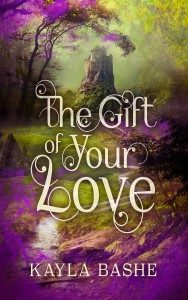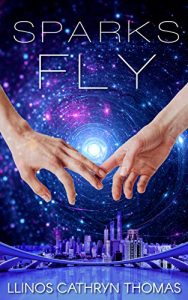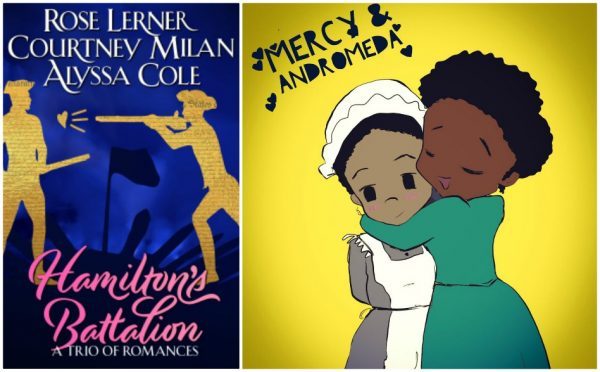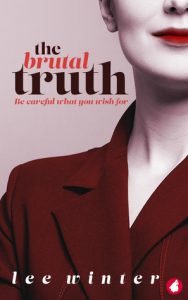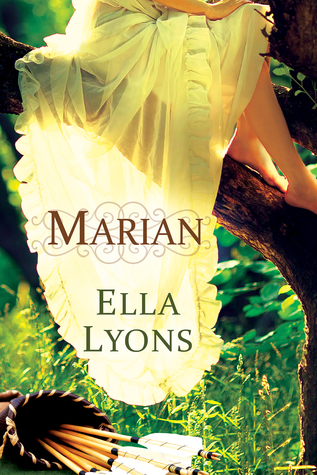The Gift of Your Love by Kayla Bashe is a good fit for anyone looking for woman-centered SFF, f/f without graphic sex scenes, or shorter queer fiction.
Neely is a foreigner who only ended up in this city by accident — she traveled here with her merchant father as a child, but he ended up dead and she grew up in an orphanage far from home. Now she’s living on the street, not just because of her lack of local family, but because of a recent heartache — an abusive boss who tossed her out into the cold world. She needs people and safety and healing — but right now, she needs apples. Tasty, tasty apples. Too bad that just after stealing them, she gets attacked by a gigantic tentacle monster.
BUT HEY, that’s not so bad if it means you get rescued by a cute butch woman whose family then takes you in under their wing? All of whom have magical powers? (As does Neely, by the way.)
Here, let me let Forester sweep you off your feet, too—
“Not a diet. I just like eating foods that will give me big muscles.” She glanced down at her already-intimidating body, which Neely thought was the perfect combination of soft and strong. “Well, bigger. My dream is to be strong enough to carry a hunting dog under each arm. That way, I’ll bring joy to anyone who sees me, because they’ll be able to get kisses from two dogs at once.”
I love the writing craft in this description of her, when we first meet her, bolding mine: “And those eyes… a wolf’s eyes, a warrior’s eyes, the deep blue at the heart of a fire.”
Also, she uses potatoes as a weapon because once they’re underground they can grow, and that’s a superpower that sings to my very heart. As well as amusing me because using a potato as a weapon.
This is Kay Bashe’s latest “adorable queer people doing their best in a speculative world while recovering from trauma” romance — yes, it’s a brand image at this point. If you’re not familiar with Bashe’s work, they often contain teams of magical girls (and sometimes nonbinary people, too, although we don’t get any in the immediate family here) that read as somewhere between superhero found-families like X-Men or Avengers plus the magical girl squads of Sailor Moon and Read or Die–except, heavily slanted towards queerness and disability representation (often reflecting Bashe’s own) and sometimes more ethnically diverse. There’s usually a heavy focus on interpersonal relationships and character development alongside the adventure itself, which is sometimes just a framework on which to hang the former meaty emotional stuff. This one slots neatly into that subgenre.
It’s short and sweet, and most of the romance consists of mutual pining for each other before a closing scene get-together — and yes, it’s that characteristic Bashe type of pining where both ladies think the other one is Far Too Amazing to Like Someone as Trash As Me (while, being anything but trash, and saving each other, and doing all kinds of brave and magical things.)
Gift of Your Love also gives us an older woman mentor figure as part of the family. For those of us who couldn’t get enough of General Organa (or having her and Admiral Holdo in the same movie!) and feel a deep emptiness that we won’t get more, this is neat.
Bashe’s characters face microaggressions and stresses that are clearly plucked from real life. One of the other ladies in the little magical family has a peanut allergy, and only the other characters’ vigilance saves her from the casual dismissiveness of a disbelieving restaurant employee–which could have led to her serious disaster. The love interest, Forester, worries that she’s not a good enough feminist because of the way her OCD causes her to hyperfocus on the picayune details — this could easily be any one of us after reading the wrong thinkpiece.
In fact, Forester’s struggles with her violent intrusive thoughts, and the way she copes with the accompanying guilt, are especially poignant having been written by an author with same. (I’ve written #ownvoices intrusive thoughts myself, with Prince Kaveh, but they’re of a different type and it was interesting for me as someone with a similar-but-different issue to see what else is out there in brainweird land.) I hope anyone else out there whose brain betrays them like this finds community in the representation and validation in her heroism.
Incidentally, the main characters are coded Jewish inasmuch as they’re outsiders from somewhere else who don’t eat pork and are written by a Jewish author.
Oh and did I mention, there’s a “oh no we’ll have to share the only bed” trope at one point? This story is adorable. Even through all the heavy themes of women struggling to find value in themselves and being far from home with nobody there for you.
Shira Glassman is a hair factory and storyteller living in a bi townhouse on the moon. She just released a new high-heat f/f romance in which a super hero lady finally asks out the damsel-in-distress she’s been rescuing (and flirting with) for months. But will they ever get to have a normal date or are there too many Monsters of the Week? Cinnamon Blade: Knife in Shining Armor is $1.99 on Kindle!

